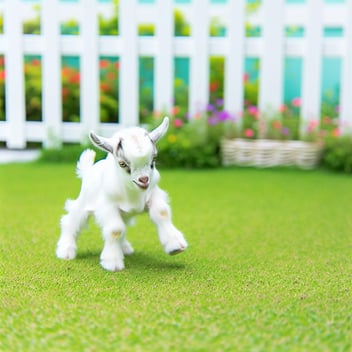Explore the intriguing world of fainting goats and uncover the secrets behind their unique behaviour.
Unveiling the Mystery: What Makes Goats Faint?
Fainting goats, also known as myotonic goats, exhibit a striking behaviour that has fascinated onlookers for centuries. When startled or excited, these goats experience a temporary muscular stiffness that can cause them to fall over as if fainting. This peculiar response is the result of a condition called myotonia congenita, a hereditary disorder affecting their muscle cells.
Despite their dramatic reactions, fainting goats do not actually lose consciousness during these episodes. The stiffness is caused by an ion channel dysfunction in the muscle fibres, which delays relaxation after contraction. The degree of stiffness can vary among individuals and is not known to cause pain or discomfort to the goats.
Understanding the Genetics of Fainting Goats
The trait responsible for the fainting episodes in these goats is inherited in an autosomal dominant manner, meaning that only one copy of the gene is necessary for the trait to manifest. Breeding practices have perpetuated the characteristic, as myotonia congenita is seen as a desirable trait within the fainting goat community.
Genetic testing can identify carriers of the gene, helping breeders make informed decisions. However, the genetic basis of fainting goats also raises ethical considerations regarding the deliberate propagation of a condition that affects the animals' muscular function.
The Role of Fainting Goats in Agriculture and Society
Initially, fainting goats were kept on farms as a novel form of livestock protection. The myotonic response was believed to safeguard the flock by distracting predators, although this strategy's effectiveness is debatable. Today, they are primarily kept for their curious behaviour, as part of petting zoos, and sometimes for their meat and milk.
In society, fainting goats have become a symbol of curiosity and a source of entertainment. Their unique trait has garnered media attention and public interest, contributing to the tourism of regions where these goats are prevalent and promoting local agricultural practices.
Caring for Your Fainting Goat: Tips and Best Practices
Caring for fainting goats is similar to caring for any other goat breed, with a few special considerations due to their condition. Providing a safe environment is critical to prevent injuries during fainting episodes. It's essential to have sturdy fencing, remove potential hazards, and offer adequate shelter.
Fainting goats require a balanced diet, regular health check-ups, and vaccinations to prevent diseases. It's also important to manage stress levels and avoid startling them unnecessarily. With proper care and a loving environment, fainting goats can live full and contented lives.
Debunking Myths: The Truth About Fainting Goats' Health and Welfare
It's a common misconception that fainting goats suffer greatly from their condition, but the truth is more nuanced. While myotonia congenita affects their muscles' function, it does not typically impair their overall health or quality of life.
Another myth is that fainting goats can be used as a form of predator control. In reality, the fainting trait may make them more vulnerable, and relying on this for predator control is neither effective nor ethical. Ensuring the welfare of fainting goats involves providing them with proper care, companionship, and respect for their unique needs.





